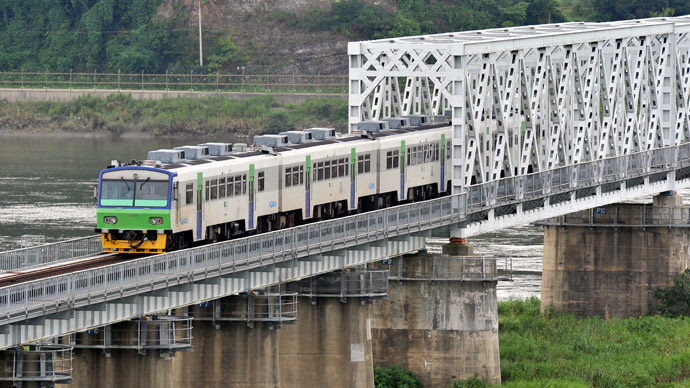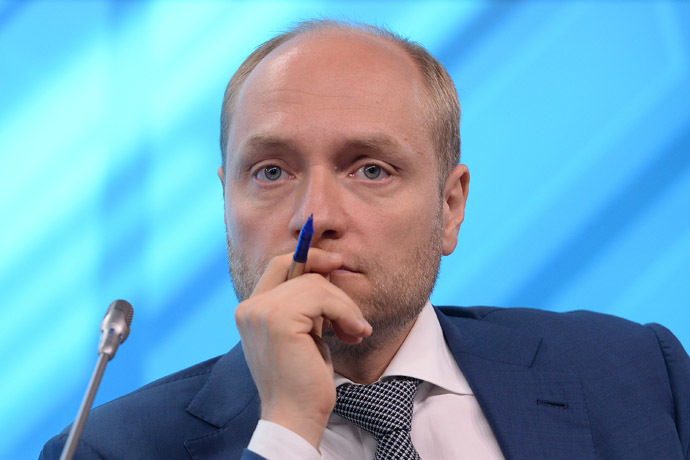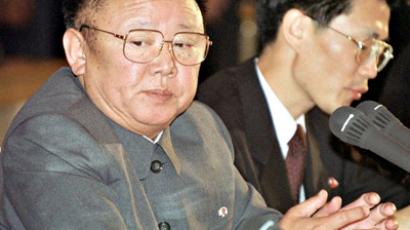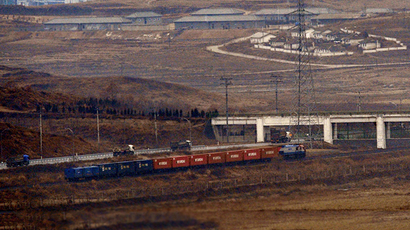Russia to extend Trans-Eurasian rail project to Korea

Russia will team up with North and South Korea in a railroad construction project that could restore peace between the two neighbors. The link will extend the world’s longest railroad, so goods can be shipped between Europe and Korea 3x faster.
Russia’s Minister for Far East Development Aleksander Galushka announced the plan to extend the Trans-Siberian Railroad at a meeting in Vladivostok on Thursday.
The expansion would provide a link between the Korean peninsula and Europe’s $17 trillion economy, making Russia a major transit route between Europe and Asia. Shipping by rail is nearly 3 times faster than via the Suez Canal, Russian Railways CEO Vladimir Bakunin has said.
“We have agreed to launch trilateral projects between Russia, DPRK and South Korea with a focus on the railroad project. It’s important to extend the Trans-Siberian Railroad to the Korean peninsula. It will serve to stabilize and improve the situation on the Korean peninsula as a whole,” Galushka said at the sixth annual Russian-Korean meeting on trade, economic, educational, and scientific cooperation.
Russian Railways has already started a direct rail service between Hamburg, Germany and Zhengzhou, China, a journey that only takes 15 days via Kazakhstan, Russia, Belarus, and Poland.
Up until now, North Korea has been very hesitant in letting in foreign partners to develop its aging and decrepit rail system.

In September, Russia re-opened a 54 kilometer railway link that connects Khasan, the last Russian city before North Korea’s border to the North Korean port of Rajin.
The extension of the 9,000 kilometer railway to North and South Korea will be a big undertaking, especially in North Korea where enormous repairs are needed to revamp the dilapidated state of the railway. The poor state of roadbeds only allows trains to travel at speeds of 20 miles per hour, or not at all.
It has already been announced that Mechel, Russia’s biggest steelmaking company, will supply materials for the first stage of the project.
Another possible partner in the equation would be South Korea’s Hyundai Construction, which has already expressed eagerness to participate in any Trans-Eurasian rail projects.
Connecting the major commercial hubs of Moscow and St. Petersburg with industrial cities in Russia’s Far East, the Trans-Siberian Railway tracks already stretch across the Ural Mountains, Siberia, to Russia’s northern port cities, and connects to routes to Mongolia and China.
Travel by railway between North and South Korea has been completely closed since 1951, and remains closed today. For a brief stint in 2007-2009, a cross-border rail service operated.
Cooperation between the two Koreas on the railway could lead to compromise on a long-delayed plan to build gas pipelines and connect both Koreas with Russian gas.

Russia's pivot east
Since the West has reacted to Russia’s actions in Ukraine with economic sanctions, Russia has begun bolstering ties with eastern neighbors like China and North Korea.
In May, Russia's state-run Gazprom signed a 30-year gas deal with China valued at $400 billion.
Russia and North Korea also announced that trade between the two countries will now be settled in rubles.
The two countries have set a goal of reaching $1 billion in trade by 2020. In 2013, trade between the neighbors rose by 64.2 percent to reach $112.7 million, which Galushka said was “not enough”.
North Korea is largely ostracized by the rest of the international community in a US-led effort to isolate the nation over its development of a nuclear weapon program.
Russia also proposed to invest into the Kaesong Industrial Park, a special economic zone in North Korea that employs more than 50,000 North Korea workers in South Korea companies.
In May, Russian President Vladimir Putin signed into law an agreement that will write off much of Pyongyang’s Soviet-era loans. Russia will forgive 90 percent of North Korea’s debt from the Soviet era, leaving $1 billion to be repaid interest free in the next 20-40 years. Russia also recently cancelled $29 billion of Cuba’s Soviet era debt.
Galushka said the forgiveness of the debt has paved the way for stronger ties between the two states.














